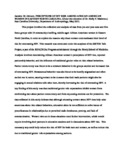Perceptions of HIV Risk Among African American Women in Eastern North Carolina
Author
Johnson, Jasmine M.
Abstract
This project involved the collection and analysis of data from pre-and post-tests and five focus groups with 54 community-dwelling, middle-aged African American women in Eastern North Carolina, in order to explore the reasons why these women underestimated their level of risk for contracting HIV. This research was conducted under the auspices of the SISTER Talk Project, a part of the REACH Out Program administered through the Brody School of Medicine. Analysis involved determining African American women's perceptions of HIV risk, reported partnership behavior, and the influence of traditional gender roles on risk-related behaviors. Partner concurrency was found to be a common behavior in the groups studied and increased risk of contracting HIV. Homosexual behavior was also found to be heavily stigmatized and often carried out in secret, causing women to be unaware that their male partners might also be engaging in sexual relations with other men, thereby increasing the risk of contracting HIV. A key finding of this study was that traditional gender role expectations inhibit women from confronting men about partner concurrency and from requesting condom use for protection. The data collected in this study indicate that although educating women about HIV does help raise awareness about risk-related behaviors, education alone is not sufficient to solve issues of powerlessness in relationships due to perceived male dominance, poverty, and lack of communication. Women who are in these situations need further intervention, which would require involving their partners in education sessions and in discussions about HIV risk. This necessary step could help reduce the risk of HIV for both men and women, as well as reduce risk due to traditional gender role expectations among partners.
Subject
Date
2012
Citation:
APA:
Johnson, Jasmine M..
(January 2012).
Perceptions of HIV Risk Among African American Women in Eastern North Carolina
(Master's Thesis, East Carolina University). Retrieved from the Scholarship.
(http://hdl.handle.net/10342/3884.)
MLA:
Johnson, Jasmine M..
Perceptions of HIV Risk Among African American Women in Eastern North Carolina.
Master's Thesis. East Carolina University,
January 2012. The Scholarship.
http://hdl.handle.net/10342/3884.
April 26, 2024.
Chicago:
Johnson, Jasmine M.,
“Perceptions of HIV Risk Among African American Women in Eastern North Carolina”
(Master's Thesis., East Carolina University,
January 2012).
AMA:
Johnson, Jasmine M..
Perceptions of HIV Risk Among African American Women in Eastern North Carolina
[Master's Thesis]. Greenville, NC: East Carolina University;
January 2012.
Collections
Publisher
East Carolina University

